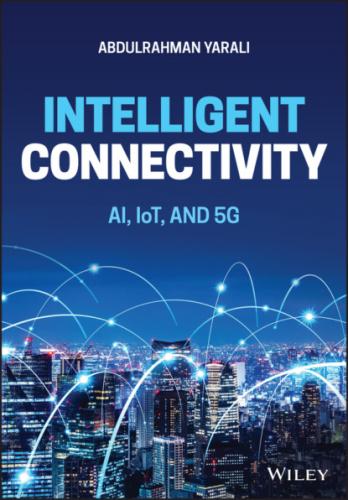296 301
297 302
298 303
299 304
300 305
301 306
302 307
303 308
304 309
305 310
306 311
307 312
308 313
309 314
310 315
311 316
312 317
313 318
314 319
315 320
316 321
317 322
318 323
319 324
320 325
321 326
322 327
323 328
324 329
Intelligent Connectivity
AI, IoT, and 5G
Abdulrahman Yarali
Coordinator of Cybersecurity Network Management POC for Center for Academic Excellence Cyber Defense Education Murray State University, KY, USA
This edition first published 2022
© 2022 John Wiley & Sons Ltd
All rights reserved. No part of this publication may be reproduced, stored in a retrieval system, or transmitted, in any form or by any means, electronic, mechanical, photocopying, recording or otherwise, except as permitted by law. Advice on how to obtain permission to reuse material from this title is available at http://www.wiley.com/go/permissions.
The right of Abdulrahman Yarali to be identified as the author of this work has been asserted in accordance with law.
Registered Offices John Wiley & Sons, Inc., 111 River Street, Hoboken, NJ 07030, USA John Wiley & Sons Ltd, The Atrium, Southern Gate, Chichester, West Sussex, PO19 8SQ, UK
Editorial Office The Atrium, Southern Gate, Chichester, West Sussex, PO19 8SQ, UK
For details of our global editorial offices, customer services, and more information about Wiley products visit us at www.wiley.com.
Wiley also publishes its books in a variety of electronic formats and by print‐on‐demand. Some content that appears in standard print versions of this book may not be available in other formats.
Limit of Liability/Disclaimer of Warranty MATLAB® is a trademark of The MathWorks, Inc. and is used with permission. The MathWorks does not warrant the accuracy of the text or exercises in this book. This work’s use or discussion of MATLAB® software or related products does not constitute endorsement or sponsorship by The MathWorks of a particular pedagogical approach or particular use of the MATLAB® software. While the publisher and authors have used their best efforts in preparing this work, they make no representations or warranties with respect to the accuracy or completeness of the contents of this work and specifically disclaim all warranties, including without limitation any implied warranties of merchantability or fitness for a particular purpose. No warranty may be created or extended by sales representatives, written sales materials or promotional statements for this work. The fact that an organization, website, or product is referred to in this work as a citation and/or potential source of further information does not mean that the publisher and authors endorse the information or services the organization, website, or product may provide or recommendations it may make. This work is sold with the understanding that the publisher is not engaged in rendering professional services. The advice and strategies contained herein may not be suitable for your situation. You should consult with a specialist where appropriate. Further, readers should be aware that websites listed in this work may have changed or disappeared between when this work was written and when it is read. Neither the publisher nor authors shall be liable for any loss of profit or any other commercial damages, including but not limited to special, incidental, consequential, or other damages.
Library of Congress Cataloging‐in‐Publication Data
Names: Yarali, Abdulrahman, author.
Title: Intelligent connectivity : AI, IoT, and 5G / Abdulrahman Yarali.
Description: Hoboken, NJ, USA : Wiley, 2022. | Includes bibliographical references and index.
Identifiers: LCCN 2021033024 (print) | LCCN 2021033025 (ebook) | ISBN 9781119685180 (hardback) | ISBN 9781119685234 (adobe pdf) | ISBN 9781119685210 (epub)
Subjects: LCSH: Internet of things. | 5G mobile communication systems. | Artificial intelligence–Industrial applications.
Classification: LCC TK5105.8857 .Y369 2022 (print) | LCC TK5105.8857 (ebook) | DDC 004.67/8–dc23
LC record available at https://lccn.loc.gov/2021033024 LC ebook record available at https://lccn.loc.gov/2021033025
Cover Design: Wiley
Cover Image: © metamorworks/Shutterstock
This book is dedicated to my kids, Fatemeh Zahra and Sadrodin Ali
Preface
The Oxford English Dictionary defines intelligence as acquiring and applying knowledge and skills. Its three definitions of intelligence demonstrate that humans and devices, buildings, and computers can possess such knowledge and skills. Intelligent connectivity is a concept that foresees the combination of high‐speed fifth‐generation (5G) networks, Artificial Intelligence (AI), and the Internet of Things (IoT) to accelerate technological development and structural changes paving the roads to enable new disruptive digital services. AI, 5G, and IoT advances are now enhancing each other, making the fifth wave of computing. The convergence of IoT, 5G wireless, and AI technologies are said to be some of the most exciting times for computing and technology and will usher in a new age of intelligent connectivity. Intelligent connectivity is not about a single product or device but a very complicated ecosystem expected to play a major role in bringing industry 4.0. These technologies work in sync with ubiquitous hyper‐connectivity, giving the users contextualized and personalized experiences. This phenomenon will significantly impact people, industries, governments, and organizations, transforming our way of life and work. The prospects at hand would be intelligent transport in self‐driving cars, intelligent healthcare systems, intelligent public safety and security systems, smart farming, smart city,
